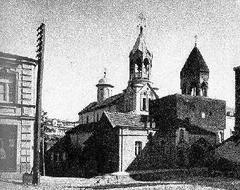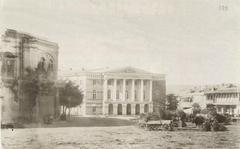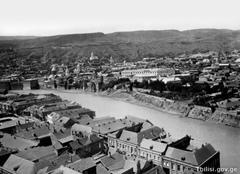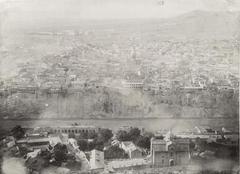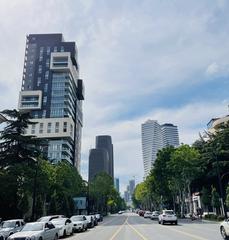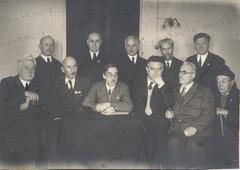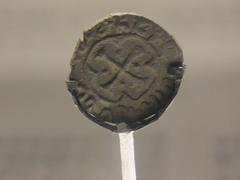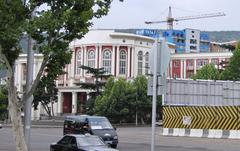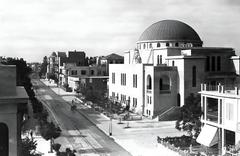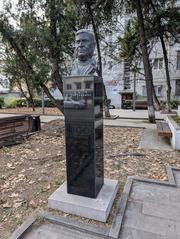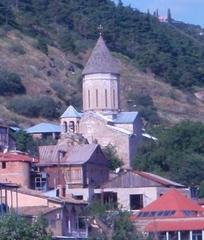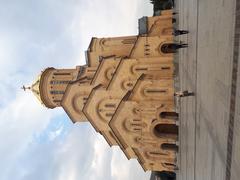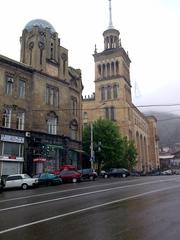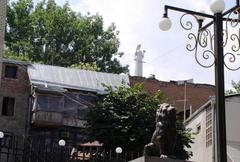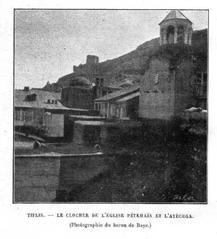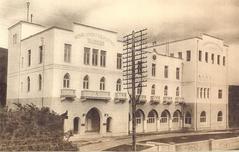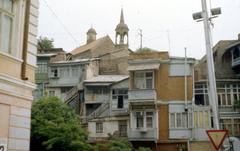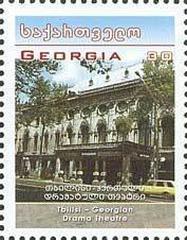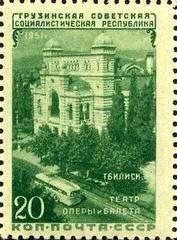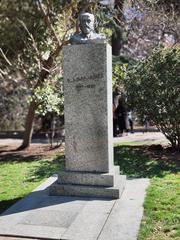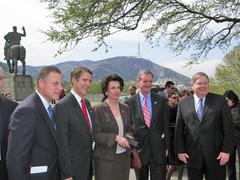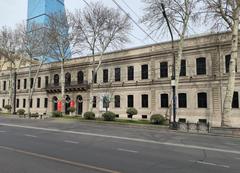Apostolic Nunciature to Georgia, Tbilisi: Visiting Hours, Tickets, and Travel Guide
Date: 04/07/2025
Introduction
The Apostolic Nunciature to Georgia in Tbilisi stands as the Holy See’s official diplomatic mission to Georgia, Armenia, and Azerbaijan. While it is not a typical tourist destination, the Nunciature is a vital link in the region’s religious, diplomatic, and cultural history. Its presence in Tbilisi signifies centuries of interaction between the Vatican and Georgia, championing religious dialogue, minority rights, and humanitarian outreach. This guide provides a detailed overview of the Nunciature’s history, its diplomatic and cultural role, visitor information, and practical travel tips for those interested in Georgia’s vibrant spiritual landscape.
For further reading, see Georgia–Holy See relations, Apostolic Nunciature, and GCatholic.org.
Table of Contents
- Historical Background
- Role of the Apostolic Nunciature
- Cultural Significance
- Humanitarian and Social Initiatives
- Visitor Information
- FAQs
- Conclusion
- References
Historical Background
The history of the Apostolic Nunciature in Georgia is anchored in centuries-old exchanges between local monarchs and the Holy See (Georgia–Holy See relations). Catholic missionary activity in the region increased during the 17th and 18th centuries, highlighting Georgia’s openness to interfaith dialogue even within a predominantly Orthodox context.
After Georgia’s independence from the Soviet Union in 1991, formal diplomatic relations with the Vatican were established in 1992. The Nunciature in Tbilisi was inaugurated soon after, extending its mandate to Armenia and Azerbaijan. Landmark moments, such as the visits of Pope John Paul II (1999) and Pope Francis (2016), further reinforced the Catholic presence and inter-religious cooperation in Georgia.
Role of the Apostolic Nunciature
Diplomatic and Ecclesiastical Functions
The Apostolic Nunciature is the Vatican’s highest-level diplomatic mission, led by the Apostolic Nuncio—who serves both as ambassador and as the Pope’s ecclesiastical representative (Apostolic Nunciature). Primary responsibilities include:
- Representing the Holy See in state and religious matters across Georgia, Armenia, and Azerbaijan.
- Acting as a liaison between the Vatican and local Catholic communities.
- Assisting with the selection and appointment of bishops (Nuncio Apostolic Diplomacy).
Vatican Diplomacy in Georgia
Distinct from secular embassies, the Nunciature’s focus extends to spiritual, humanitarian, and moral concerns. The Nuncio advocates for human rights, religious freedom, and social justice (Role and Tasks of the Apostolic Nuncio). The Nunciature is also influential in the diplomatic community, often holding the position of dean of the diplomatic corps where recognized.
Cultural Significance
In Georgia—where Orthodox Christianity is the dominant faith—the Apostolic Nunciature plays a crucial role in promoting religious harmony and minority rights. It has been instrumental in securing legal recognition for the Catholic Church and supporting legislative reforms for minority protections (Georgia–Holy See relations).
Humanitarian and Social Initiatives
The Nunciature supports charitable work in Georgia through organizations like Caritas, providing aid to refugees, vulnerable populations, and those affected by regional conflicts. These efforts underscore the Vatican’s commitment to social justice and reconciliation in the South Caucasus.
Visitor Information
Location and Accessibility
- Address: 40 Zghenti Street, Nutsubidze Plateau, Tbilisi, Georgia (GCatholic.org)
- The Nunciature is situated in a peaceful residential area in western Tbilisi, easily accessible by taxi or public transport.
- The closest metro station is Delisi; from there, a short taxi or bus ride will bring you to the Nunciature.
Visiting Hours and Appointments
- The Nunciature is not open for general tourism; all visits must be arranged by appointment.
- Typical office hours: Weekdays, 9:00 AM to 5:00 PM; closed on Georgian and Vatican holidays.
- For appointments or special event access, contact via the official website or email.
Visitor Guidelines and Security
- Dress Code: Modest attire is required. Men should wear long trousers and covered shoulders; women should cover knees and shoulders, with headscarves recommended for chapels or religious events (wander-lush.org).
- Security: Valid ID is required; bag checks are routine. Photography is prohibited inside unless explicitly permitted.
- Conduct: Maintain respectful behavior and observe all diplomatic and religious protocols.
Nearby Attractions
The Nunciature’s location offers access to several significant sites:
- Holy Trinity Cathedral (Sameba): Georgia’s largest Orthodox cathedral.
- Catholic Cathedral of the Assumption of the Virgin Mary: The main Catholic church in Tbilisi.
- Anchiskhati Basilica: The oldest surviving church in Tbilisi.
- Old Tbilisi: Explore diverse religious architecture and vibrant neighborhoods (Tbilisi Travel Guide).
For more on local attractions, see Georgia.travel.
Tips for Travelers
- Appointments: Always required for entry.
- Dress conservatively: Both for the Nunciature and nearby religious sites.
- Language: English, Italian, and Georgian are commonly spoken; basic Georgian greetings are appreciated.
- Accessibility: The site offers limited facilities for visitors with mobility needs; inquire ahead if necessary.
- Best time to visit: Late spring and early autumn for mild weather.
Frequently Asked Questions (FAQ)
Q: Can I visit the Apostolic Nunciature without an appointment?
A: No, visits are strictly by appointment for official or religious purposes.
Q: Are there guided tours or tickets?
A: No public tours or ticket sales; the Nunciature is a diplomatic site.
Q: Is photography allowed inside?
A: Photography is generally not permitted unless explicitly authorized.
Q: Can I attend Mass at the Nunciature?
A: Public Masses are usually held at the Catholic Cathedral, not at the Nunciature.
Q: How do I reach the Nunciature?
A: By taxi or public transport to Nutsubidze Plateau; nearest metro is Delisi.
Conclusion
The Apostolic Nunciature to Georgia in Tbilisi is a unique intersection of diplomacy, faith, and cultural heritage. Though not open for casual visits, understanding its role enriches your appreciation of Georgia’s religious landscape and the Vatican’s global presence. Plan ahead, respect protocols, and use this guide to enhance your travel experience in Tbilisi and beyond.
For updated information, special events, or to arrange a visit, regularly check the official Vatican Georgia website and GCatholic.org.
References
- Georgia–Holy See relations
- Apostolic Nunciature
- Apostolic Nunciature to Georgia – GCatholic.org
- Nuncio Apostolic Diplomacy – Omnes Magazine
- Role and Tasks of the Apostolic Nuncio – Apostolic Nunciature in Poland
- Tbilisi Travel Guide
- Tbilisi Travel Tips
- wander-lush.org
- Georgia.travel
- Official Vatican Georgia website
- visa-to-travel.com
- wellmedcharitablefoundation.org
- govserv.org
